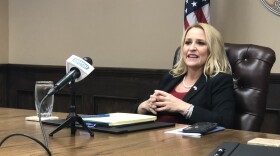After a series of environmental disasters, which scientists and researchers blame on climate change, there are growing calls for political leaders and energy companies to take major steps to reduce greenhouse gas emissions and improve energy efficiency. It has also gotten a former Arkansas U.S. congressman and a retired Entergy Arkansas CEO wondering how things might have been different these days had legislation proposed in 2009 been approved.
Recovery efforts are still ongoing in Louisiana nearly a month after Hurricane Ida came ashore with sustained winds of 150 miles-per-hour, ripping the roofs off of buildings and snapping powerpoles. It then dumped large amounts of water as it moved across the country toward the northeast, eventually causing massive flooding in the New York City subway system.
The National Hurricane Center said the storm strengthened rapidly from category 1 to category 4 over about a 24 hour period because of unusually warm water in the Gulf of Mexico of about 85 degrees.
The American Clean Energy and Security Act of 2009 was a cap and trade system similar to the European Union Emission Trading System. There were fierce partisan divisions about the bill. It passed in the U.S. House of Resentatives by a vote of 219-212, with most Republicans voting against it, but was never brought to the floor of the Senate for debate and died.
“That was the last big effort to try to do something about climate change in America,” said former U.S. Rep. Vic Snyder, a Democrat of Little Rock. “And you look what has happened since then.”
Snyder, who served in Congress from 1997 to 2011, noted in an interview with KUAR News recent record-breaking temperatures, water shortages, along with severe drought conditions, which are blamed for a series of massive wildfires in the western U.S.

“My home state of Oregon, you know, I've been out there during these fires. The cemetery where my mom is buried, the grass burned there from a fire a couple of years ago,” he said.
What was unique about the proposal, Snyder said, was that it had the backing of then-Entergy Corporation CEO J. Wayne Leonard, who died in 2018. The company, which has a network of coal, natural gas and nuclear power plants, serves four states, including Arkansas.
“I asked their lobbyist, ‘What's going on with Wayne Leonard?’ And they just said he is convinced that climate change is coming; that if we don't do everything we can to head it off by making these kinds of changes, we will pay a price down the line,” Snyder said.
Leonard recognized the changes included in the bill would be very expensive, Snyder said, but supported it and urged members of Congress to vote for it.
“And when I say [Entergy and its lobbyists] supported it, I mean, they were aggressively doing everything they could to round up votes for it in the House. I give them some credit for it passing in the House,” Snyder said. “It was pretty comprehensive, though it was not a perfect bill. I fully expected the Senate to do something and then we would have final votes and get some legislation into law. But it never happened on the Senate side.”
There were arguments that the bill would drive up energy prices and raise taxes, but Snyder says he doesn’t know why the bill was never brought up for debate in the Senate and was surprised by the inaction.
“That’s politics,” says retired Entergy Arkansas CEO Hugh McDonald, who reported to Leonard. “You have to expect all scenarios.”
In an interview Friday, McDonald said, “Wayne was a guy that I really respected because he saw this as an issue before most any utility company executive in the country.”
McDonald said Entergy had established its own greenhouse gas emission goals in the early 2000s. It supported the cap and trade bill and, given the amount of power Entergy gets from nuclear power plants, included the argument that nuclear generation should be considered on an equal footing as renewables, saying they’re efficient and effectively CO2 emission free.
If the 2009 proposal had passed in Congress, McDonald said it would have pushed the industry to set goals that many utilities are only now agreeing to set.
“There’s no doubt that bill would have accelerated the industry from where it is today. We might have seen carbon reduction targets five or 10 years ago had that passed, but a lot of it is dependent on the technology of renewable energy and cost competitiveness of renewable energy,” McDonald said. “Some might have argued 10 years ago that utility-scale solar or wind wasn’t ready or the transmission system might not have been ready to support what has been built out.”
Entergy is now facing a class action lawsuit in Louisiana, accused of “gross negligence” for failing to maintain its infrastructure, which led to widespread avoidable blackouts from Hurricane Ida. The litigation claims Entergy knew from a 2007 “Hardening Study” that there were significant problems, but they were never addressed.
Snyder says a lot has been learned since the 2009 bill died in the Senate. He hopes Congress will again attempt comprehensive reform.
“If we had done something differently 12 years ago, would it have made a difference by now in what we're doing? Maybe, maybe not,” Snyder said. “We would have been seen as a leader in the world. Maybe the world community, including the Chinese and our coal plants, would have done things differently. But the reality is America lost 12 years, and we still haven't done anything in a comprehensive manner.”






